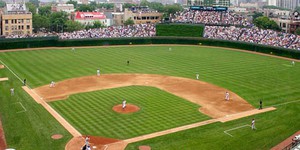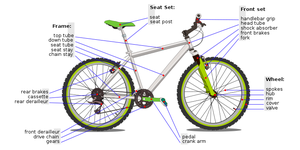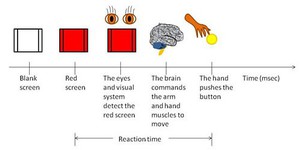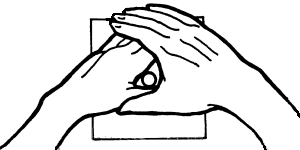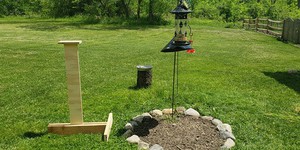Others Like “How Fast Is Your Reaction Time?” (top 20 results)
|
What do Nolan Ryan, Mark Wohlers, Armando Benitez, and Roger Clemens have in common? These men are all major league baseball pitchers who have pitched baseballs at 100 miles per hour or greater! What does it take to throw a baseball this fast? Does it come down to having the biggest muscles? Can a ball thrown this fast also be accurate? In this sports science fair project, you will learn about the biomechanics of pitching. Investigate how body position and physics interact to produce fast…
Read more
Are you into cycling and speed? Then this is the science fair project for you! In this science fair project, you will determine the best gear ratio for your bike, to get the highest speed after a curve and onto a straightaway. You will learn a lot about applied mechanics and gears, all while having fun riding your bike.
Read more
Are you a piano player or a video gamer? Then you might have a quick reaction time that can come in handy while playing sports. Find out how to measure your reaction time and compare it to your friends and family with this fun experiment.
Read more
Place a desk chair (one that rotates easily on ball bearings) in the center of the room, away from any obstructions. Put your hands on your lap and have a helper give you a push to start you rotating. You'll need to quantify the results somehow. For example, your helper could measure the number of revolutions you make in 5 seconds. Now try extending your arms after your helper starts you spinning. Next, start with your arms out, and bring them in close to your body after you start…
Read more
You'll need: a puck, a hockey stick, a tape measure, at least one helper with a stopwatch and an empty rink. Have your friend start the watch just as you make contact with the puck, and stop it when the puck hits the boards. Measure the distance and divide by the time to get the speed of the puck. With two helpers and two stop watches, you can time the puck at center ice and at the far end. Are the speeds the same? How about if you don't follow through, but stop your stick as soon as it…
Read more
When someone yells, "Think fast!" and throws you a ball, are you able to catch it? When the bell rings at the end of class, are you the first one out of your seat? Can you make it through a sudden hairpin turn in a video game without crashing? If so, then you likely have quick reaction times. In this science fair project, you'll look at reaction times (how fast people react to sensory events), and see if people who play video games have faster reaction times than those who do not.
Read more
Everyone's used to the idea that people are either right-handed or left-handed for particular tasks. That is, one hand is preferred (or dominant) over the other for a particular task. Did you know that people also have a dominant eye? This project is designed to look for consequences of having the dominant hand and eye on the same side of the body (uncrossed) vs. having the dominant hand and eye on opposite sides of the body (crossed).
Read more
This project idea is inspired by former NASA engineer Mark Rober's "Squirrel Ninja Obstacle Course":
You do not need to build a full obstacle course as intricate as Mark's (although you certainly can if you want to!) to make this into a fun science project. For example, how far can squirrels jump? You could test this question by building a mobile post and placing it next to a bird feeder. The bird feeder in Figure 1 is mounted on a metal pole. The pole is protected by a squirrel baffle, a…
Read more
Does the force of drag have an effect on the distance the puck will travel? Think of a way to launch the puck with a reproducible force, and examine the effect of launching the puck in different orientations on the distance it travels. For more information on the physics, see Haché, 2002.
Read more
Aerodynamics and Hockey: Does the Force of Drag Have an Effect on the Distance the Puck Will Travel?
Think of a way to launch the puck with a reproducible force, and examine the effect of launching the puck in different orientations on the distance it travels. For more information on the physics, see Haché, 2002.
Read more
|
Explore Our Science Videos
How to Build an ArtBot
Mold Hard Boiled Eggs
Build A River Model – STEM Activity


